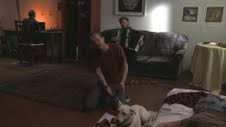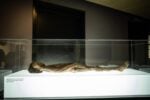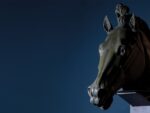Roee Rosen – Out / The Death of Cattelan

Roee Rosen è artista, regista e scrittore. Uomo di straordinaria cultura, attraverso la sua opera utilizza magistralmente la provocazione intellettuale anche assumendo posizioni moralmente ambigue e punti di vista paradossali. La sessualità intrecciata alla politica, la questione israeliana e un’attenta osservazione delle dinamiche storico-sociali percorrono il suo lavoro intriso di ironia e una feroce critica alla contemporaneità.
Comunicato stampa
La Galleria Riccardo Crespi presenta Out / The Death of Cattelan la prima personale in Italia dell’artista israelo-americano Roee Rosen.
Roee Rosen è artista, regista e scrittore. Uomo di straordinaria cultura, attraverso la sua opera utilizza magistralmente la provocazione intellettuale anche assumendo posizioni moralmente ambigue e punti di vista paradossali. La sessualità intrecciata alla politica, la questione israeliana e un’attenta osservazione delle dinamiche storico-sociali percorrono il suo lavoro intriso di ironia e una feroce critica alla contemporaneità.
Out (Tse) è il titolo del mediometraggio premiato nel 2010 alla 67esima Mostra Internazionale d’Arte Cinematografica di Venezia per la sezione Orizzonti e all’Internationale Kurzfilmtage di Oberhausen con l’ARTE Prize for a European Short Film. Recentemente il film è stato nominato per l’European Film Award - Short Film 2011 che sarà presentato a Berlino il 3 dicembre.
Il film si presenta come un ibrido tra un documentario, una fiction che fa eco ad un particolare genere di film horror, una scena erotica ed una riflessione politica.
La scena centrale - non recitata ma eseguita da due donne le cui preferenze nella vita reale includono elementi BDSM (Bondage-Domination-Sadism-Masochism) – ruota attorno ad un rituale in cui il pestaggio sadomasochista si trasforma in esorcismo: i dolorosi colpi assestati dalla Dominatrice portano la vittima a sputare citazioni del ministro degli esteri israeliano, Avigdor Lieberman, noto esponente della destra israeliana.
L’antefatto, un’intervista alle due partecipanti, sembra dapprima un normale documentario sulle loro esperienze nella scena sado-masochista israeliana, ma ben presto si trasforma in un’esposizione della premessa narrativa dell’opera, secondo la quale una delle donne è posseduta dal Demonio, l’altra interpreta la figura dell’esorcista. La scena musicale finale è una canzone sulle parole di Letter to Mother del poeta russo Esenin. Eseguita in un’unica ripresa, la canzone non solo eleva e complica l’eco emozionale di quanto precede, ma è anche un omaggio diretto, benché distorto, alla scena finale di un altro film che esplora l’ibridismo, la sessualità estrema e la politica: WR, The mistery of the Organism, di Dusan Makavejev.
In The Death of Cattelan, 2011, una serie di 16 collage a tecnica mista, dalla quale è stata prodotta un’edizione di copie anastatiche, Roee Rosen costringe l’osservatore a decodificare una narrazione attraverso 16 pagine provenienti da fonti diverse – dai libri di favole ai siti di notizie agli annunci pubblicitari - tenendo nota di alcune parole cerchiate, l’osservatore può leggere parallelamente i testi originali ma anche un racconto. Il messaggio nascosto avrebbe a che fare con la fittizia morte di Maurizio Cattelan così come con il racconto della scomparsa di una brillante art consultant da parte del marito di lei. L’ibrido testuale rispecchia l’aspetto visivo saturato di illustrazioni proprie dei codici miniati medioevali, dei libri per bambini e di motivi erotici, ma anche di scarabocchi ossessivi di una mente cospiratoria che sospetta un possibile intrigo dietro le misteriose circostanze della tragedia della moglie e quella di Cattelan.Una interrogazione ambigua sul concetto di verità.
Il tema che Rosen sta sviluppando tra le righe del suo scenario artistico è la morte, privatamente intesa, nel suo senso fisico, ma anche come un luogo nel passato, la memoria e la storia e – ancora più importante – dal di vista teorico, come un fatto dinamico. La morte nel lavoro di Rosen è viva e vegeta.
Il fulcro dell’azione di Roee Rosen si origina dalla mescolanza di arte visiva, letteratura e cinema per incontrare complesse narrazioni tra realtà e finzione, in mistificazioni rischiose e provocatorie.
Roee Rosen è nato a Rehovot, Israele, nel 1963. Vive e lavora in Israele.
Tra le mostre più recenti:
personali: 2011 The Dynamic Dead Roee Rosen, Ujadowski Castle, Varsavia, Polonia - 2009 The Confessions of Roee Rosen, Center of Contemporary Art, Tel Aviv, Israele - Roee Rosen/ Justine Frank, Extra-City, Antwerp , Belgio
collettive: 2011 Animism. Modernity through the looking glass, Generali Foundation, Vienna, Austria - 2010 67. Mostra Internazionale di Arte Cineematografica di Venezia - Short Film Festival Oberhausen, Germania - Stop Making Sense, Oslo Kunstforening, Norvegia- Trembling Times: Recent Videos form Israel, Tate Modern, Londra, Regno Unito - The Calm Before the Storm, Winzavod Art Center, Mosca, Russia - The Narcissism of Minor Difference, MICA Maryland Institute College of Art, Baltimora, Stati Uniti - Overview, Israeli Video, 2000-2010, Haifa Museum of Art, Haifa, Israele – 2009 Festival of Confusion, Beursschouwburg Art Center, Brussels, Belgio - 2008 Manifesta 7, Trento
_____________________________________________________________
Roee Rosen
Out / The Death of Cattelan
Critical text by Antonio Somaini
Preview 16 November 2011 h. 18.30
17 November 2011 - 28 January 2012
Galleria Riccardo Crespi presents Out / The Death of Cattelan, the first solo exhibition in Italy of the Israeli-American artist Roee Rosen.
Roee Rosen is an artist, film director and writer. A man of extraordinary culture, he makes masterly use of intellectual provocation in his work, in part by assuming morally ambiguous positions and paradoxical points of view. Sexuality intertwined with politics, the question of Israel and an attentive observation of historical and social dynamics pervade his work, which is infused with irony and a vitriolic criticality.
Out (Tse) , Rosen’s film from 2010, won the best medium-length film award in the Horizons section at the 67th Venice Film Festival, as well as the ARTE award for best European Short Film at the International Short Film Festival in Oberhausen. It is presently nominated for the European Academy award.
The film is a hybrid between a documentary, fiction film echoing a particular genre of horror film, an erotic performance and a political reflection.
In the film’s central scene – not acted but actually performed by two women whose real-life preferences include elements of BDSM (Bondage-Domination-Sadism-Masochism) – sadomasochist thrashing is turned into an exorcism: the painful blows meted out by the Dom cause the sub to spew out quotes from Israel’s Minister of Foreign Affairs, Avigdor Lieberman, known as member of the right-wing politicians in the country.
The preceding interview with the two participants at first seems to be a straightforward documentary about their experiences on the Israeli BDSM scene, but soon turns into an exposition of the work’s narrative premise, that one of the women is possessed by Lieberman, while the other may use her sexual predilection to serve as an exorcist. The final musical scene is a song set to the words of the Russian poet Sergei Esenin’s ‘Letter to Mother’. Filmed in a single shot, the song not only elevates and complicates the emotional echo of what went before, but is also a direct, if warped, homage to the last scene of another film that explores hybridism, extreme sexuality and politics: Dusan Makavejev’s WR, Mysteries of the Organism.
In The Death of Cattelan, 2011, a series of 16 mixed media collages, from which an edition of facsimile copies has been produced, Roee Rosen obliges the viewer to decode a narration hidden through 16 pages taken from different sources – from fairytale books to internet news sites and advertisements, By circling some of the letters, the viewer can simultaneously read the original texts, but also a story. The hidden narration unveils the circumstances of the death of Maurizio Cattelan as well as the account of the death of a brilliant art consultant by the writer - her husband. The textual hybrid is also a visual one, replete with vignettes connoting not only mediaval illuminated manuscripts, children illustrations and erotic motifs, but also the obsessive scribbles of a conspiratorial mind, suspecting a possible ploy behind the mysterious circumstances of the tragedy of his wife and that of Cattelan. An ambiguous investigation of the concept of truth.
The theme that Rosen is exploring between the lines of his artistic scenario is death, understood both in the private, physical sense, and as a place in the past, as memory and history but more importantly: as a speculative, dynamic affair. Death in Rosen’s work is alive and kicking.
The heart of Roee Rosen’s action lies in way he mixes visual art, literature and cinema to produce complex narrations somewhere between reality and make-believe, risky and provocative mystifications.
Roee Rosen was born in Rehovot, Israel, in 1963. He lives and works in Israel.
Among his recent exhibitions:
solo: 2011 The Dynamic Dead Roee Rosen, Ujadowski Castle, Warsaw, Poland – 2009 The Confessions of Roee Rosen, Center for Contemporary Art, Tel Aviv, Israel – Roee Rosen/ Justine Frank, Extra-City, Antwerp, Belgium
joint: 2011 Animism. Modernity through the Looking Glass, Generali Foundation, Vienna, Austria – 2010 67. Venice Film Festival, Venice, Italy – Short Film Festival Oberhausen, Germany – Stop Making Sense, Oslo Kunstforening, Norway – Trembling Times: Recent Videos from Israel, Tate Modern, London, UK – The Calm Before the Storm, Winzavod Art Center, Moscow, Russia – The Narcissism of Minor Difference, MICA Maryland Institute College of Art, Baltimore, US – Overview, Israeli Video, 2000-2010, Haifa Museum of Art, Haifa, Israel – 2009 Festival of Confusion, Beursschouwburg Art Center, Brussels, Belgium – 2008 Manifesta 7, Trent, Italy



